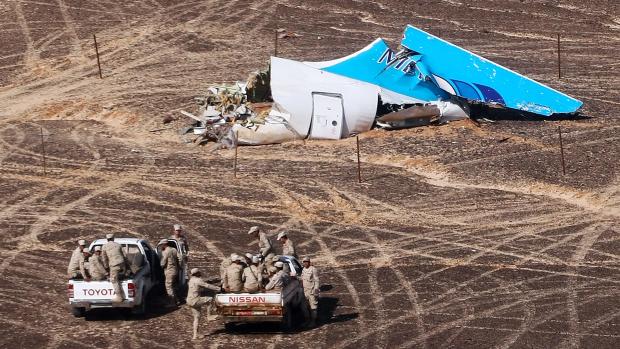Grief, questions for Russian plane crash families
ST. PETERSBURG -- The first 10 bodies of victims of Saturday's plane crash over Egypt were identified by their families Tuesday, a string of tearful relatives leaving the city crematorium.
Alexei Smirnov of the Russian emergency situations ministry said that a total of 140 bodies and more than 100 body parts were delivered to St. Petersburg on two government planes on Monday and Tuesday and that a third plane was expected to bring more remains later Tuesday.
Metrojet's Airbus A321-200 en route from Egypt's Sharm el-Sheikh to St. Petersburg crashed over the Sinai Peninsula on Tuesday, killing all 224 on board. The overwhelming majority of the passengers were Russian holidaymakers flying home.
Mourners continued to come to St. Petersburg's Pulkovo airport on Tuesday to lay flowers and leave paper planes and soft toys at the arrivals hall. On the outskirts of town, tearful families of the victims were leaving the premises of the crematorium where the identification procedures are taking place.
The Tass news agency on Tuesday quoted Alexander Rzhanenkov, an official at the St. Petersburg city hall, as saying that the first two bodies could be released to their families on Tuesday. He did not identify the victims but said they were from the St. Petersburg suburbs and a neighboring region.
Confusing reports and theories have emerged as to what could have caused the crash.
Some aviation experts raised the possibility that a bomb on board the Airbus brought it down, while others cited an incident in 2001 when the aircraft grazed the runway with its tail while landing.
Metrojet firmly denied that the crash could have been caused by either equipment failure or crew error.
CBS News correspondent Allen Pizzey reports the puzzle of what caused the crash got a new piece with the detection by a U.S. infrared satellite of a heat flash in the same area at the time the plane was going down.
If the flash was from the plane, analysts say it could have been caused by an explosion in a fuel tank or engine as result of mechanical failure. But a bomb on board still cannot be ruled out, according U.S. Director of National Intelligence James Clapper.
"We don't have any direct evidence of terrorist involvement, yet," Clapper said.
CBS News correspondent David Martin reports the satellite detected two surges of infrared energy, or heat flashes. The first one happened when the plane broke up, and a second when it hit the ground. This satellite is designed to detect missile launches from anywhere on the Earth and the fact that it did not detect a missile launch prior to the breakup of the plane -- combined with the fact that ISIS is not known to have a missile capable of reaching so high -- is why a shoot-down is considered unlikely by the Pentagon.
In Egypt, the U.S. Embassy has instructed its staff not to travel anywhere in the Sinai Peninsula pending the outcome of the investigation into the crash as a "precautionary measure."
The United States, Germany and Britain all had overflight warnings in place for the Sinai. They advised airlines to avoid flying over the peninsula below 26,000 feet and to avoid the Sharm el-Sheikh airport due to extremist violence and, notably, the use of anti-aircraft weapons.
Egyptian President Abdel-Fattah el-Sissi insisted on Tuesday that the security situation in the Sinai Peninsula is under "full control" and that claims by the Islamic State group that it downed the plane were "propaganda" aimed at damaging the country's image. In an interview with the BBC released Tuesday, el-Sissi also reiterated his assertion that the cause of the crash may not be known for months and that, until then, the causes should not be speculated on.
Islamic State of Iraq and Syria (ISIS) militants said on the day of the crash that they had "brought down" the Russian plane to avenge those killed as a result of Moscow's recent air campaign in Syria, launched in support of ISIS adversary President Bashar Assad.
But the group did not provide any evidence to back up its claim, and militants in northern Sinai have not to date shot down commercial airliners or fighter jets.
